While New York has legalized medical marijuana and dispensaries have opened across the state, one lawyer who represents medical marijuana businesses said the industry will grow at a slow pace because of the differences between federal and state marijuana laws.
Attorney Marc Ross, speaking at a Nassau Academy of Law forum at the Nassau County Bar Association Monday, said the designation of medical marijuana by the federal government as illegal discourages banks from accepting money from businesses, even though it is legal at the state level.
“It’s very difficult to open up a bank for marijuana because marijuana is federally illegal,” Ross said. ““If the financial institution knows or has reason to believe that a conduct involves illegal activity, you have to fill out a report and give notification of that.”
Gov. Andrew Cuomo signed the Compassionate Care Act in July 2014, which would allow patients in New York who suffer from designated medical conditions to be certified by their physicians to receive medical marijuana.
Ross said the federal government heavily monitors how close businesses are to the growth and manufacturing of medical marijuana, and the closer a business gets, the more likely a bank will cut off ties.
“If you’re arguably ‘touching a plant,’ if you’re a grower in California, then you may be required to terminate the banking relationship with these entities,” he said.
While Ross said he understands why the federal government keeps a close eye on the industry, he also said it was hypocritical for deeming it illegal but still having a patent on medical marijuana.
A patent is the right to exclude other entities from making, using, or selling an invention or product.
The federal government has designated marijuana as a “Schedule 1” drug, or a drug with a “high profile for abuse and has no currently accepted medical use in treatment.”
Ross said the “Schedule 1” designation makes no sense because the drug is designated as having no medical benefit, but the patent articulates a medical functionality.
“I don’t know why that’s not discussed, but it’s a fact,” he said.
Ross, who represents both private and public medical marijuana companies, also said investors are hesitant to fund public companies because of the chance the federal government will come shut them down.
“People are just scared of being in that business and it doesn’t make sense because it is a bona fide business,” he said.
At the end of January, Long Island’s first two medical marijuana dispensaries opened in Lake Success and Riverhead.
Although patients now have access to the medication they need, attorney Barry Peek said the state has not offered them significant availability to the product.
The state authorized five companies to operate four dispensaries each throughout the state.
“Clearly this is not enough to cover a state with 20 million people over 54,000 square miles,” Peek said. “It puts a tremendous hardship on those people who need it most; those who are disabled and those who can’t drive hours to get it.”
He also said since only 400 doctors across the state are registered to certify patients for medical marijuana, finding a doctor can be difficult.
Another issue, Peek said, was the state’s “seed-to-sale” requirement, meaning an organization must be able to produce, manufacture, test, deliver and dispense the product themselves.
“This is not a business for slim pockets,” he said.
While medical marijuana still has negative stigmas, Peek said. he believes the industry will prosper in New York, even though it is currently growing at a slower pace than other states like California and Colorado.
“These are not stoners involved in this business,” he said. “These are doctors, businessmen and great lawyers.”



